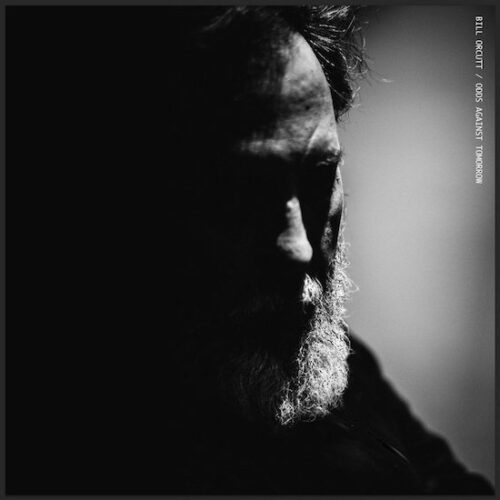It was in 2009, 11 years after he released his final album with the volatile Miami-based abstract noise punk duo Harry Pussy that he played in alongside his ex-wife Adris Hoyos (’98’s Let’s Build a Pussy), when Bill Orcutt released his revolutionary debut solo album of blues and folk abstractions A New Way to Pay Old Debts. That album – a set of solo guitar songs performed by Orcutt on an acoustic guitar with its A and E strings removed and a banjo string added and amplified through a DeArmond pickup yielding a grotesque and insidious tone – deconstructed and fragmented American blues and roots music yielding a volatility that wasn’t totally out of step with Orcutt’s abstract no wave spasms in Harry Pussy.
Over the last ten years, Orcutt’s guitar playing has evolved towards melody and, at times, genuine beauty. But the continuity in Orcutt’s discography is that all of his albums have exuded a melancholic longing for a time when music was central to the culture and allowed us to glimpse into a future full of radical possibilities. In novelist Jeff Jackson’s 2018 novel Destroy All Monsters: The Last Rock Novel, one of its musician characters finds himself despaired that he gets more enjoyment from mindlessly adding obscure artists to his Apple Music library than he gets from actually listening to any of it. Orcutt’s music pines and pleads for a time when music meant something.
Orcutt’s music has evolved in both approach and aesthetic as evidenced by the artist’s newest solo LP Odds Against Tomorrow. He has traded his vintage acoustic guitar for an electric, and for the first time ever has made use of multi-tracking that results in a denser and more lush recording quality on this set of songs. Maybe ironically, Orcutt’s electric work is less volatile and chaotic than the acoustic records that Orcutt has released in the recent past. On the contrary, Odds Against Tomorrow is contemplative and, at times, undeniably beautiful. If earlier albums like A New Way to Pay Old Debts desublimated blues and roots music, Odds Against Tomorrow resublimates it. On this set of tracks, Orcutt mourns the loss of expressivity in music and conjures the fantastical spirit of the blues.
On the album’s gorgeous title track, Orcutt’s new approach is made clear. The song opens with lush high-pitched finger picking before Orcutt multitracks in opposing oscillating chord progressions resulting in an almost uplifting swirl of southern rock guitar melodies. On ‘The Sun and its Tomorrow,’ Orcutt’s breathtaking soloing occasionally jarringly sputters out into brief punctuations of dissonance, almost as if he has located a spirit in the ether of his blues and is trying to materialize them within the corporeal realm.
The somber licks of ‘The Conversion Experience’ are testament to Orcutt’s virtuosity as a musician. Conversion to what, though? To faith? To belief? Perhaps the title of the song alludes to Orcutt himself who has made a conversion in his music: where there was once a chaotic and jarring sound there is now something contemplative and serene. Listening to Orcutt’s history as a guitar player is a testament to the spiritual journey of a man.
The cocksure classic licks of ‘Stray Dog’ exude a Southern Gothic libidinal energy. Close your eyes, and you’ll see yourself in a Louisiana bayou backwoods bar replete with jukebox, clouds of smoke, the stank of swamp and whiskey, and an uncanny atmosphere populated by dejected, lost souls. The short track is testament to the eerie implication of narrative that even the most skeletal of blues tracks are capable of producing. ‘All Your Corpses Begin to Speak’ is the track most forthright in its ritualistic nature sounding like Orcutt using frenzied soloing to raise the dead. Around the 03:35 marker, one can visualize the rotting corpses becoming resplendent with animation as the multi-tracking of the licks achieves crescendo.
One other notable shift in Orcutt’s approach is that the artist no longer directly references and annihilates historical blues and folk anthems (as he has in the past with takes on ‘Star Spangled Banner,’ ‘Black Betty,’ and others). Instead, Orcutt has opted to subtly allude to the autodidactic creative spirit of the roots music he, in a way, historicizes. The only “cover” on the album is an elegiac take on twentieth century American television and film composer Harry Mancini’s (notably, not a blues musician) ‘Moon River.’
Orcutt has shed himself of any constraints that working with hundred year old classic songs might present. Orcutt works within a loose musical tradition and milieu to unearth other sentiments at the core of the blues: despondency, loss, longing, grief, and the beauty of primal expression. Odds Against Tomorrow’s final track ‘Man Dies’ encapsulates the dual nature of the blues as one of both corporeality and transcendence: man plays the blues, man dies, man’s soul lives on in his blues.
In a 1993 article for the Chicago Reader, writer and blues critic David Whiteis lamented the fact that people often only focused on the violence and degradation of the blues and failed to acknowledge its multitudes of expressive complexities, often to the point of racist stereotyping. “The eloquence of the blues lies in its celebration of the human condition in all its flawed glory,” writes Whiteis. “The blues creates art of profound and lasting beauty by portraying the world as it is, not as we like it to be.” Perhaps Orcutt also found concern in the fact that his vicious deconstructions of the blues performed on his four-string vintage acoustic guitar were also harping on some of the troublesome stereotypes of the music he was historicizing. Because his newer electric guitar material, and Odds Against Tomorrow in particular, sounds more like a “celebration of the human condition” than any of his previous albums ever have. The album is melancholic and in mourning for the sublime expressivity of American roots music.



